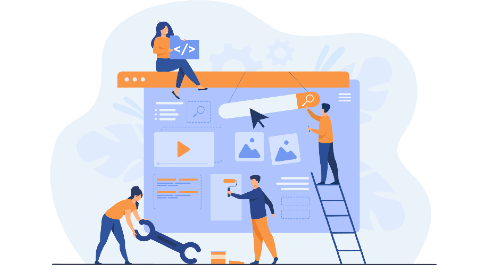Integrating AI into Website Development: Opportunities and Challenges
Integrating AI into website development opens doors to personalized experiences tailored to each user’s preferences and needs. AI algorithms can analyze user behavior, preferences, and interests to create customized content recommendations, product suggestions, and navigation pathways. This level of personalization fosters deeper engagement, increased satisfaction, and enhanced brand loyalty, transforming the way users interact with websites. While AI presents opportunities to enhance user experiences, streamline operations, and drive business growth, its integration into website development also presents a unique set of challenges that must be addressed to ensure successful implementation.
With insights from experts and practical guidance, this blog equips you with the knowledge and tools to navigate the AI integration process successfully, ensuring that your website becomes a hub of personalized experiences, streamlined operations, and data-driven decision-making.
The Opportunities AI Brings
Artificial intelligence (AI) has emerged as a transformative force, poised to revolutionize various industries, including website development. As AI continues to permeate our digital world, its integration into website development presents opportunities, unlocking new possibilities for enhanced user experiences.
Personalized User Experiences
One of AI’s most compelling opportunities in website development is the ability to deliver personalized user experiences. AI algorithms can analyze user behavior, preferences, and interests to create tailored content, product recommendations, and navigation pathways. This level of personalization fosters deeper engagement, increased satisfaction, and enhanced brand loyalty.
Enhanced Search and Navigation
AI-powered search algorithms can transform the way users interact with websites, providing more relevant and accurate results that align with their specific search queries. Using advanced tools like the best AI search tool, developers can refine website search performance, improve contextual accuracy, and enhance overall user engagement. AI can also optimize website navigation by suggesting contextual links and pages, guiding users seamlessly through the site’s architecture. This enhanced search and navigation experience reduces frustration, improves task completion rates, and ultimately drives conversions.
Automated Content Creation
AI can streamline website content creation by automating tasks such as generating product descriptions, blog posts, and social media updates. This automation frees up valuable time for human writers to focus on more creative and strategic content initiatives while still ensuring a consistent and engaging website experience for users.
Chatbots and Virtual Assistants
AI-powered chatbots and virtual assistants for ai customer service can revolutionize customer support by providing real-time assistance, answering questions, and resolving issues 24/7. These AI-driven interactions offer immediate support, reduce wait times, and enhance customer satisfaction, leading to increased retention and positive brand perception.
Anomaly Detection and Fraud Prevention
AI can play a crucial role in safeguarding websites from fraud and cyberattacks. AI algorithms can analyze user behavior and data patterns to detect anomalies and suspicious activities, enabling proactive measures to prevent fraud and protect sensitive information. This enhanced security instills trust in users and protects the integrity of the website.
Integrating AI into website development presents a wealth of opportunities to enhance user experiences, streamline operations, and drive business growth. As AI technology continues to mature, its impact on website development will only deepen, shaping the future of digital interactions and transforming the way we connect with the online world.
Challenges in AI Integration
While integrating artificial intelligence (AI) into website development offers many opportunities, it also presents a set of unique challenges that must be addressed to ensure successful implementation and adoption. These challenges span various aspects of AI integration, from data privacy and security concerns to the complexities of integrating AI into existing website frameworks and workflows. Partnering with a top-trusted Web Development Company can help navigate these challenges effectively, ensuring seamless AI integration and optimal website performance.
Data Privacy and Security
The collection, storage, and utilization of user data for AI-powered features raise significant concerns about data privacy and security. Websites must implement robust data governance practices, ensuring transparency in data collection, transparent data usage policies, and robust data security measures to protect user information from unauthorized access, misuse, or breaches.
Explainability and Transparency
AI algorithms can exhibit complex decision-making processes, challenging understanding of how they arrive at specific conclusions. This lack of explainability can raise concerns about bias, fairness, and potential discrimination.
To address these concerns, website developers must strive for transparency in AI decision-making, providing users with clear explanations of how AI-powered features operate.
Integration with Existing Systems
Integrating AI into existing website development workflows and frameworks can be complex, requiring substantial technical expertise and careful planning. Developers must ensure that AI components seamlessly integrate with existing systems, maintaining compatibility with current infrastructure and avoiding disruptions to ongoing operations.
Cost Considerations
Implementing AI in website development can be costly, particularly for small businesses. The initial investment in AI technology and ongoing maintenance and update costs must be carefully evaluated against the anticipated benefits and return on investment.
Ethical Considerations
The use of AI in website development raises ethical considerations, such as the potential for manipulation, discrimination, and the perpetuation of biases. Website developers must adhere to ethical guidelines, ensuring that AI-powered features are developed and used responsibly, promoting fairness, inclusivity, and respect for user autonomy.
Despite the challenges posed by AI integration, its potential benefits for website development cannot be overlooked. By addressing data privacy concerns, developers can overcome these hurdles and pave the way for a future where AI seamlessly enhances user experiences, drives business growth, and revolutionizes the way we interact with websites.
AI Technologies in Website Development
Artificial intelligence (AI) has emerged as a transformative force, poised to revolutionize the way we create, optimize, and interact with websites.
AI technologies are not just futuristic possibilities; they are already being integrated into website development, empowering businesses to deliver personalized, intelligent, and adaptive experiences to their users.
AI-Powered Personalization
One of the most compelling applications of AI in website development is personalization. AI algorithms can analyze user behavior, preferences, and interests to create tailored content, product recommendations, and navigation pathways. This level of personalization fosters deeper engagement, increased satisfaction, and enhanced brand loyalty.
A website that adapts to your individual preferences, suggests products you might like, showcases content relevant to your interests, and guides you seamlessly through the site’s architecture. This is the future of website interactions powered by AI.
Enhanced Search and Navigation
AI-powered search algorithms are transforming the way users interact with websites. These algorithms can analyze search queries, user context, and past behavior to provide more relevant and accurate results. AI can also optimize website navigation by suggesting contextual links and pages, guiding users effortlessly through the site’s structure. This enhanced search and navigation experience reduces frustration, improves task completion rates, and ultimately drives conversions.
Imagine a search experience that anticipates your needs, understands the nuances of your query, and presents the most relevant results without you even having to specify everything. AI-powered search is making this a reality.
Automated Content Creation
AI is streamlining website content creation by automating tasks such as generating product descriptions, blog posts, and social media updates. This automation frees up valuable time for human writers to focus on more creative and strategic content initiatives while still ensuring a consistent and engaging website experience.
What is more, a website that can automatically generate fresh, engaging content based on current trends, user preferences, and industry insights. AI-powered content creation is making this possible.
Chatbots and Virtual Assistants
Chatbots are virtual assistants powered by AI that revolutionize customer support by providing real-time assistance, answering questions, and resolving issues 24/7. These AI-driven interactions offer immediate support, reduce wait times, and enhance customer satisfaction, leading to increased retention and positive brand perception.
For instance, a website where you can instantly interact with a virtual assistant, resolve issues, get recommendations, and receive personalized support without waiting in line or having to email back and forth. AI-powered chatbots are making this a reality.
Anomaly Detection and Fraud Prevention
AI can play a crucial role in safeguarding websites from fraud and cyberattacks. AI algorithms can analyze user behavior and data patterns to detect anomalies and suspicious activities, enabling proactive measures to prevent fraud and protect sensitive information.
For example, a website that can monitor its network traffic, user behavior, and data patterns in real-time, identifying and preventing fraudulent activities before they cause harm. AI-powered fraud detection is making this a reality.
AI’s integration into website development isn’t a trend but a transformative force shaping the future of digital interactions. Empowering businesses to craft intelligent, adaptive, and visually appealing websites, AI enhances user experiences and streamlines operations. Embracing AI’s transformative power unlocks new possibilities, fostering growth and success in the dynamic digital landscape.
Weblium: Simplifying AI Website Development
For those who want to harness the power of AI without deep technical knowledge, Weblium offers a smart, user-friendly solution. It’s a modern website builder with built-in AI tools—including AI-generated texts, smart visual suggestions, auto-styled blocks, and fast creation of both landing pages and multi-page websites.
Thanks to its Figma integration and flexible Flex block feature, users can bring complex visual ideas to life without touching a line of code. Weblium makes it easy for small businesses, freelancers, and designers to launch AI-powered websites that adapt to user behavior, generate content dynamically, and streamline the development process. It’s a real-world example of how AI is transforming website development—not in the future, but right now.
Real-World Examples
AI technologies are not just futuristic possibilities; they are already being integrated into various aspects of website development, empowering businesses to deliver personalized, intelligent, and adaptive experiences to their users. Here are 4 examples that can broaden your aspects of its importance:
Netflix
Netflix is a prime example of AI-powered personalization in website development. Their recommendation algorithm analyzes user viewing history, ratings, and search behavior to suggest movies and TV shows that align with individual preferences. This tailored approach has contributed to Netflix’s immense popularity and user engagement.
Amazon
Amazon is another notable example of AI-powered search and navigation. Their search algorithm utilizes natural language processing (NLP) to understand the nuances of user queries and provide relevant results, even if the search terms are misspelled or incomplete. This intelligent search functionality has contributed to Amazon’s dominance in the e-commerce industry.
Sephora
Sephora is utilizing AI-powered chatbots to provide customers with personalized beauty advice and product recommendations. The chatbot, Sephora Virtual Assistant, can answer questions about skincare, makeup, and fragrance and even recommend products based on individual preferences and skin types. This personalized approach has enhanced customer engagement and satisfaction.
PayPal
PayPal utilizes AI to detect and prevent fraudulent transactions in real-time. AI algorithms analyze transaction data, user behavior, and device information to identify patterns and anomalies that may indicate fraudulent activity. This approach has helped PayPal maintain high security and protect its users from financial scams.
Tips for Successful Integration
Integrating AI into website development requires careful planning, strategic implementation, and ongoing evaluation. This section provides a collection of practical tips to help you navigate the path to AI-powered success, ensuring a seamless and effective integration that maximizes the benefits of this transformative technology.
1. Start with a Clear Vision and Strategy
Before embarking on AI integration, it’s crucial to have a clear understanding of your goals and objectives. Define how AI will enhance your website’s functionality, user experience, and business outcomes. Develop a comprehensive strategy that outlines the specific AI use cases and how they will be integrated into your existing website development processes.
2. Choose the Right AI Technologies
With a diverse range of AI technologies available, selecting the ones that best align with your specific needs and requirements is essential. Consider factors such as the type of data you have, the desired outcomes, and your technical expertise. Evaluate different AI solutions and compare their capabilities to ensure you choose the most suitable tools for your project.
3. Gather and Prepare High-quality Data
AI algorithms rely on data to learn and make predictions. Your data’s quality and relevance will significantly impact your AI-powered features’ performance. Gather data from various sources, ensuring it is accurate, consistent, and free from biases. Clean and prepare the data to make it suitable for AI analysis.
4. Build a Strong Team with AI Expertise
Integrating AI requires a team with diverse skills and expertise. Assemble a team that includes AI engineers, data scientists, web developers, and domain experts. Collaborate effectively to ensure everyone is aligned with the project’s goals and understands their roles and responsibilities.
If you don’t have enough resources to build a team, then renting one is also a good option. Many countries offer great outsourcing web development services in the world nowadays.
5. Start with Small, Manageable Projects
Don’t try to revolutionize your entire website with AI overnight. Begin with small, manageable projects that allow you to experiment with different AI technologies and gain experience. This approach will help you identify potential challenges and refine your AI implementation strategy before scaling up.
6. Continuously Monitor and Evaluate
AI is an evolving field, and your AI-powered features will need ongoing monitoring and evaluation. Track key performance indicators (KPIs) to assess the effectiveness of your AI integration. Gather user feedback and adapt your AI models based on real-world usage and performance data.
7. Ensure Ethical and Responsible AI Practices
Ethical principles and responsible practices should guide AI integration. Consider the potential impact of integrating AI on user privacy, fairness, and transparency. Implement data governance measures and establish clear ethical guidelines for AI development and deployment.
8. Stay Up-to-date with AI Advancements
The field of AI is constantly evolving, with new technologies and techniques emerging regularly. Keep yourself informed about the latest AI advancements and explore how they can be applied to your website development efforts. Continuous learning will ensure your AI integration remains relevant and effective.




Leave a Reply